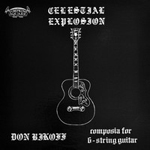|
|
 |
Dusted Reviews
Artist: Don Bikoff Album: Celestial Explosion Label: Tompkins Square Review date: Apr. 24, 2013 |

|
|
|
 |
Musically speaking, the 1960s is the age of the dinosaurs, and I’m not talking about dinosaur rock. It would seem that enough musicians deposited a record in the mud of commercial failure that we remain flush with black gold just waiting to be discovered, just as the compressed remains of countless generations of brontosauri sit beneath the ground, just waiting for some enterprising vandal to blast it into your gas tank or drinking water.
Don Bikoff’s sole LP Celestial Explosion is just the latest example. The Long Island-based acoustic guitarist recorded it in 1968, when he was just 20, for the long-extinct Keyboard Records. The record went the way of all non-viable species, appearing less and less often in cutout racks and used bins until the advent of internet-facilitated record trading rendered copies as rare as Passenger pigeon chicks.
But while the technology to raise up new dinosaurs from fossilized DNA is still a ways off, it’s possible to reanimate a record simply by mastering a new copy from old vinyl. That’s what’s been done with Celestial Explosion. While Bikoff never made another record, he’s still alive and well, spooking his grandkids with Skip James covers and playing the occasional gig at church fundraisers and motorcycle stores. He connected with Tompkins Square, a label that has undertaken the championing of new talents and rescuing undeservedly obscure older ones from out-of-print limbo.
Anyone yearning for more of the kind of music that filled that first Takoma sampler, Contemporary Guitar (they didn’t call it American Primitive back in the day), will likely be well pleased by Celestial Explosion. Like John Fahey, Harry Taussig and Max Ochs, Bikoff synthesized elements of blues and country to come up with powerfully evocative music. Bikoff is an unhurried picker, the better to let one hear the beauty that lies beyond the technique, and a fluid slide guitarist. Since he made the record in 1968, there’s a tinge of psychedelic seasoning, mostly judiciously applied echo. But what makes this record hold up after you get over the thrill of discovery is its unfussy soulfulness. Like so many in the Takoma stable, Bikoff made music that told stories encoded with personal significance. Hiding behind the Leslie effect on “Riverside Park Blues” is a walk down a path of reverie and yearning. “Bathing Prohibited In The River Styx” never oversells its winking premise, but it’s hard not to smile as it gently tugs at your leg. And a discordant lead makes “Today Has No Tomorrow” exude quiet, yet absolute trepidation, which is only partially ameliorated by the sweeter melodies that try to take a step back from the edge. Was he imagining a draft notice when he wrote it, or maybe a Dear John letter from his girlfriend? Whatever the inspiration, its music with feeling, and it’s good to feel it now.
By Bill Meyer
|







